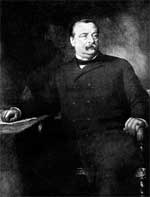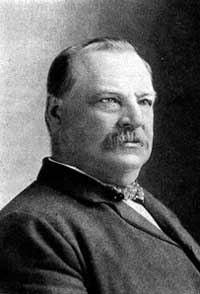Gover Cleveland William Harry Henderson Then Cleveland Came Back Again
Grover Cleveland, the only President to ever serve nonconsecutive terms, was the 22nd and 24th President of the United States (1885-89) (1893-97). He was known to exist honest, independent, and opposed to corruption and the spoils system. His motto "A public part is a public trust," demonstrated his stubborn courage and integrity. Born in Caldwell, New Jersey on March 18 l837, he is noted for many things. His friends called him "Uncle Colossal" considering of his size and jolly demeanor. He was the first sheriff of Buffalo, New York to hang a homo.
![]()
Grover Cleveland'south minister begetter died when Grover was just sixteen. While Grover was growing up, the Cleveland family moved around quite a bit. At age fourteen, young Grover had gone to work to help support the family. He worked for two years equally an assistant at the New York Plant for the Blind. Ultimately, he left home to go west and seek his dreams, merely only got as far as Buffalo, where he ended up staying and working on an uncle'due south farm. Within a year, Grover became a clerk at a law house and began to written report police. He was shortly admitted to the bar. For his work in the Governors race he was named assistant District Attorney in Erie Canton. He ran in his first election for District Chaser and lost. Then he ran for sheriff and won. He gained a reputation for being honest and exposing corruption. Cleveland went on to go the mayor of Buffalo and Governor of New York, where he came into the national spotlight.
![]()
As Governor, Cleveland connected his fight for reform. He lost the back up of New York's Autonomous Political party when he argued with Party Chairman, John Kelly. He lost public back up when he vetoed a bill that would accept lowered the fare on the elevated railroads in New York City.
![]()
 In spite of these problems with the political party and the people, Cleveland ran for President. His reputation for integrity made him the ideal candidate to run against the Republicans, who, at that point, had become identified with corruption and scandal. Cleveland defeated James Blaine to go the get-go Democrat elected to the presidency since the Civil State of war. As President, he continued his fight for reform. Upholding the merit system, he not only denied government jobs to thousands of party members, but he convinced Congress to repeal the Tenure of Office Human activity and so that he could remove officials appointed by the previous administration without having to await until their terms expired.
In spite of these problems with the political party and the people, Cleveland ran for President. His reputation for integrity made him the ideal candidate to run against the Republicans, who, at that point, had become identified with corruption and scandal. Cleveland defeated James Blaine to go the get-go Democrat elected to the presidency since the Civil State of war. As President, he continued his fight for reform. Upholding the merit system, he not only denied government jobs to thousands of party members, but he convinced Congress to repeal the Tenure of Office Human activity and so that he could remove officials appointed by the previous administration without having to await until their terms expired.
Cleveland vetoed a bill that would take immune American Civil State of war veterans to collect pensions for disabilities that occurred after the war, and he stood against protective tariffs on imported appurtenances. During his first term, he married Frances Folsom, condign the but President to wednesday while in the White House. Although he received the majority of popular votes, he lost the 1888 election to Benjamin Harrison.
 In 1892 Grover Cleveland was re-nominated, and this time he beat Harrison. This made him the only US President to serve nonconsecutive terms. He took office again just as the nation was entering a low. His second administration was beset by political and industrial unrest. He invoked the Monroe Doctrine and threatened, if necessary, to use strength to arbitrate a dispute with Britain over a Southward American boundary. He recognized the new regime American settlers had established in Hawaii, and he prevented expeditions from leaving the U.s.a. to assist the rebels in Cuba.
In 1892 Grover Cleveland was re-nominated, and this time he beat Harrison. This made him the only US President to serve nonconsecutive terms. He took office again just as the nation was entering a low. His second administration was beset by political and industrial unrest. He invoked the Monroe Doctrine and threatened, if necessary, to use strength to arbitrate a dispute with Britain over a Southward American boundary. He recognized the new regime American settlers had established in Hawaii, and he prevented expeditions from leaving the U.s.a. to assist the rebels in Cuba.
In the Pullman Strike of 1894, Cleveland sent troops in to interruption the strike on the grounds that movement of the U.s. mail was beingness halted. He repealed the Sherman Silver Purchase Act in order to maintain the golden standard of the dollar. When Cleveland left office, the Us economy was even so in a depression and the United States Treasury was nearly bankrupt. In spite of his stubborn courage and elementary honesty, Grover Cleveland was not able to solve the issues facing the nation at that fourth dimension. He was truthful to his ideals and, when he thought he was right, said "no," fifty-fifty to powerful groups such as farmers, manufacturers and veterans.
![]()
Upon leaving office in 1897, Grover Cleveland settled in Princeton, New Bailiwick of jersey, lecturing, writing, and transacting business until he died in that location on June 24, 1908. On his deathbed he summed upwards his life well by saying "I accept tried then difficult to exercise right."
Source: https://www.sheppardsoftware.com/History/presidents/Presidents_22_Cleveland.htm
0 Response to "Gover Cleveland William Harry Henderson Then Cleveland Came Back Again"
Post a Comment